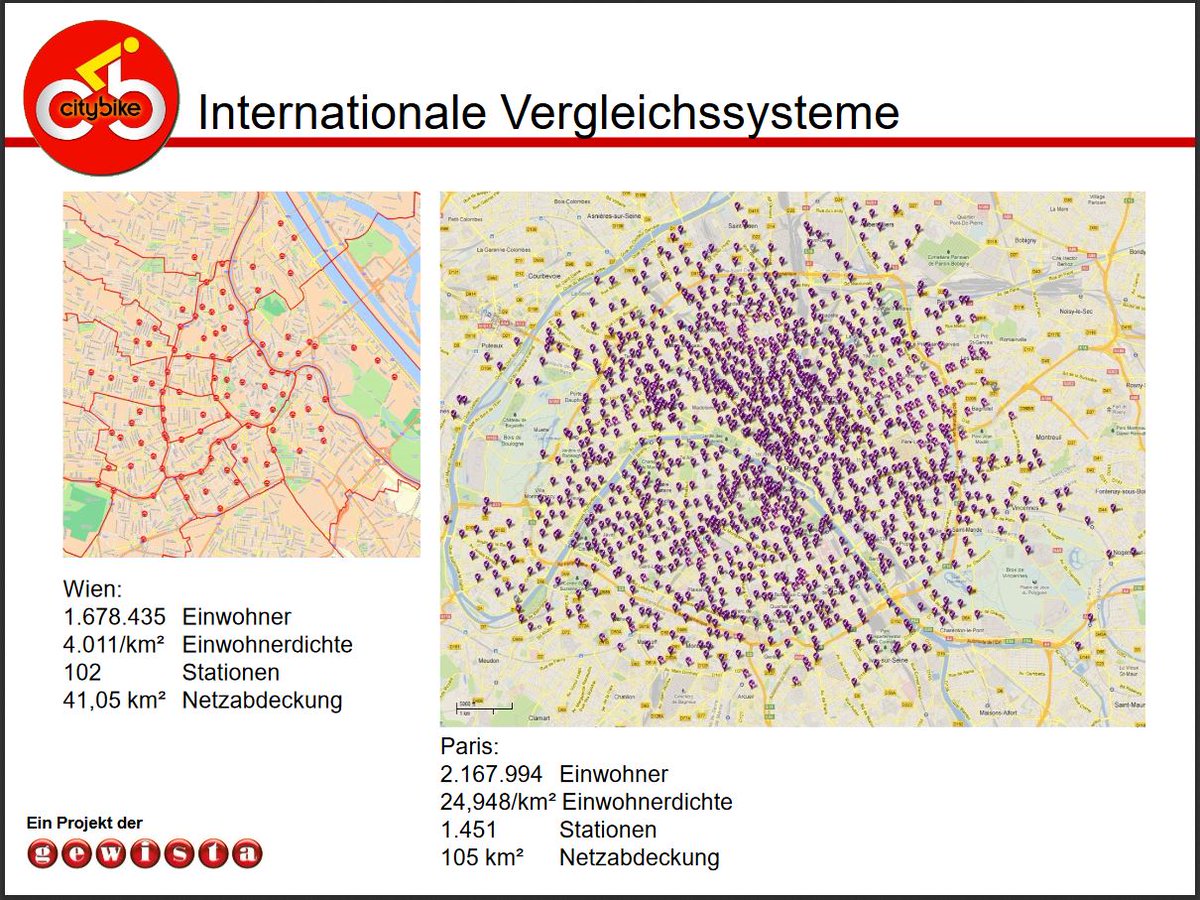Death and regeneration of world-class bike sharing system during Viennese election campaign - a thread. #bikesharing #citybike #wienwahl2020 1/
Vienna has a long history with bike sharing systems (BSS) and could be proud of being the place where the first successful BSS was developed. You can read my paper about BSS in Vienna it here: https://doi.org/10.1016/j.tranpol.2020.03.009 ;)
Let's start with looking into the history... 2/
Let's start with looking into the history... 2/
In 2003, the city announced that it is looking for a bike sharing operator. The outdoor advertising company Gewista was commissioned without a public tender procedure and developed the Citybike Wien system. (See report of the city’s audit court http://www.stadtrechnungshof.wien.gv.at/berichte/2012/lang/04-01-KA-I-28-1-13.pdf ) 3/
Experience with unsuccessful predecessors came in handy for developing the station based BSS with smart rental conditions and bikes engineered in a way to reduce vandalism and theft. 4/
The scheme was quite popular and successful, recording more than 1 mio rides per year ( https://www.citybikewien.at/de/news/485-jahresbilanz-2018). Unfortunately only 121 stations were built (with about 1,500 bikes) - they don't cover all districts and stations are too far away from one another (~ 700m) 5/
which makes it not really attractive to use for people who don't live or work near one of the stations. This is also the reason why I personally used them hardly ever. 6/
But the system was famously exported to cities worldwide by French @JCDecauxGlobal (majority owner of Gewista) as the "Cyclocity" scheme: http://en.cyclocity.com/ 7/
I personally came to really appreciate it only during my Erasmus semester in Lyon ( @grandlyon / @villedelyon), where the system was employed for the first time on a larger scale as Vélo'v in 2005. 8/
In contrast to Citybike in Vienna, there are much more stations for less inhabitants (349 stations with 4,000 bikes which translates to 1 bike per 121 inhabitants - according to https://web.archive.org/web/20131019210919/http://www.newsring.fr/actualite/1006193-paris-fete-les-six-ans-de-son-velib-en-infographie) and they are closer to one another. 9/
And the bikes are very well maintained, in 2015 I enjoyed the introduction of a new generation of modern bikes. For three months I was mobile only by using the shared bikes, walking and the occasional tram ride. 10/
But the Cyclocity scheme only got really famous after launching as Vélib' @Velib in Paris, in 2007 on an even larger scale. By 2008 there were 1,200 station with about 16,000 bikes (~ a station every 300 metres throughout the city centre and 1 bike per 97 inhabitants). 11/
Please take a moment to look at this comparison of stations in Vienna and Paris:
(Source: https://www.fvv.tuwien.ac.at/fileadmin/mediapool-verkehrsplanung/Bilder/Lehre/Ring-VO_Radfahren/2013-06-17_dechant.pdf) 12/
(Source: https://www.fvv.tuwien.ac.at/fileadmin/mediapool-verkehrsplanung/Bilder/Lehre/Ring-VO_Radfahren/2013-06-17_dechant.pdf) 12/
Unfortunately there was the infamous meltdown of #Velibgate around 2018 when Smovengo took over Vélib' operations after winning the new tender, following 10 years of JCDecaux operations.
See https://www.theguardian.com/world/2018/may/04/paris-bike-share-scheme-velib-hi-tech-upgrade-problems by @achrisafis
or: https://www.bloomberg.com/news/articles/2018-05-08/what-happened-to-velib-paris-s-glitchy-bikeshare-system by @FeargusOSull 13/
See https://www.theguardian.com/world/2018/may/04/paris-bike-share-scheme-velib-hi-tech-upgrade-problems by @achrisafis
or: https://www.bloomberg.com/news/articles/2018-05-08/what-happened-to-velib-paris-s-glitchy-bikeshare-system by @FeargusOSull 13/
I don't know exactly what happened there but I can imagine that city representatives in Vienna and people from Gewista might have been influenced by this meltdown in a way that prevented a new tender for the BSS in Vienna. 14/
So what is happening in Vienna at the moment? Elections take place in Oct & transport evolved into a major campaign topic - also because of @platzfuerwien? The initiative demands climate friendly transport and has already collected ~30.000 signatures for its petition. 15/
After the majority government of the Social Democrats (SPÖ) ended in 2010, they had to form a coalition with the Green party and since then, the department for transportation has been led by the green junior partner. 16/
Ever since, the coalition agreements included the expansion of Citybike, with the last one happening in 2013. The 2015 agreement ( https://www.wien.gv.at/politik/strategien-konzepte/regierungsuebereinkommen-2015/pdf/regierungsuebereinkommen-2015.pdf?fbclid=IwAR1k2ieWhEZpI3r1sh6y9a8R5FchyFbd-eB8PCl1pjDVMmRwIHXtZtUcp5Y) stated a densification of stations in the existing operating area - but nothing happened. 17/
The contract with Gewista allowed no more than 121 stations, to expand it, the city would have to carry out a public tender which it avoided until now. In between there was the Paris meltdown & some confusion with ofo and oBike, challenging if Citybike should be expanded. 18/
On to the hot part: In May 2020 Gewista threatened to close half of the BSS stations if they don't receive money from the city (about 1 mio Euros per year) (see: https://wien.orf.at/stories/3049647/). 19/
Facing issues with other sharing operators as well, the city already passed a new strategy for transport sharing operators in June 2020, including a new tender for bike sharing planned for 2021. 20/
Deputy mayor and head of city transport @BirgitHebein (Green party @gruenewien) negotiates with Gewista and suggests that @wienerlinien, the city owned public transport operator sponsors the BSS until the tender
(see: https://wien.orf.at/stories/3059426/). 21/
(see: https://wien.orf.at/stories/3059426/). 21/
Apparently the negotiations failed. On 10th July Citybike announces that it will shut down half of the stations (see: https://www.derstandard.at/story/2000118624425/wiens-citybike-system-vor-dem-aus-haelfte-der-stationen-wird), which happened almost instantly. 22/
So after operating the system for 17 years, they shut down half of the stations 3 months prior to elections. This essentially kills the system since the remaining 60 stations are by far not enough to make it an attractive transport mode. Sad times for bike sharing fans. 23/
Then suddenly yesterday (29 July) mayor @BgmLudwig (SPÖ @SP_Wien) announces that he himself commissioned Wiener Linien to take over Citybike (see: https://twitter.com/BgmLudwig/status/1288424026075930624 and https://www.ots.at/presseaussendung/OTS_20200729_OTS0122/buergermeister-ludwig-beauftragt-wiener-linien-mit-betrieb-der-citybikes ) 24/
Now let's take a closer look at Gewista, Wiener Linien and the Social Democrats: Gewista was founded in 1921 as a city-owned company (remember: SPÖ majority government), was privatized in the 90s and today JCDecaux is the major shareholder with 67%. 25/

 Read on Twitter
Read on Twitter


